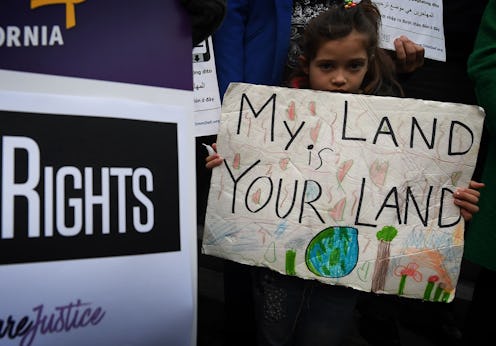News
Federal Judge Blocks Texas' Sanctuary City Ban From Going Into Effect Just Yet

News broke on Wednesday that a Texas federal judge blocked a ban on sanctuary cities. The proposed law, signed in May by Republican Gov. Greg Abott, would've prevented cities and and counties from giving local officials the right to refuse to cooperate with immigration enforcement policies. It would have additionally given police officers the authority to question those they detain or arrest about their immigration status. Judge Orlando L. Garcia based his decision on constitutional grounds.
“The best interest of the public will be served by preserving the status quo and enjoining, prior to Sept. 1, the implementation and enforcement of those portions of SB 4 that, on their face, are preempted by federal law and violate the United States Constitution,” the judge wrote in his decision.
Senate Bill 4 (S.B. 4), the law's official name, was originally set to take effect on Friday. Garcia's block, while temporary, will allow a lawsuit challenging the measure to proceed. In order to receive an injunction, local governments needed to prove the measure would cause harm to their cities in addition to successfully arguing its unconstitutionality. The Fifth Circuit Court of Appeals in New Orleans has the right to appeal Garcia's decision.
Garcia found that the law would potentially violate the First Amendment rights of those targeted by the law. He also argued that S.B. 4's provision requiring officials to cooperate with "immigration detainer requests" — which allow the transfer of foreign-born detainees who have been released from state or local custody to federal custody — would "inevitably lead to Fourth Amendment violations.”
S.B. 4 would've given the state attorney general the authority to fine or remove local officials who “adopt, enforce, or endorse a policy under which the entity or department prohibits or materially limits the enforcement of immigration laws.”
The law was criticized as anti-immigrant, particularly anti-Latino, by its opponents. Some Texas law enforcement officers argued that the law could potentially backfire and make solving crimes more difficult.
“We want people to report crime, whether they’re a victim or a witness, regardless of their immigration status,” El Paso County sheriff Richard Wiles told The New Yorker. “What if the only witness to a crime is an undocumented nanny, or the gardener, or a construction worker? And now they don’t call in what they see!”
Travis County sheriff Sally Hernandez said in February that authorizing local officials to question people on their immigration status would weaken the community's trust in her deputies, who rely heavily on information provided by the public.
“Our jail cannot be perceived as a holding tank for ICE,” Hernandez said. “We cannot afford to make our community less safe by driving people into the shadows.”
Opponents of S.B. 4 celebrated Judge Garcia's decision on Wednesday. “We won over 90 percent of it,” Luis Vera, a lawyer for the League of United Latin American Citizens, said. “The state cannot mandate to the cities or police officers or sheriff’s offices how they run their police departments.”